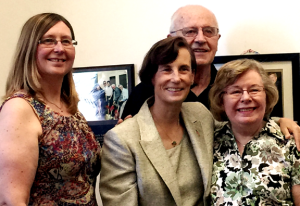
By: State Rep. Linda Dean Campbell
July, 2105
Francis “Fran” Gradzewicz, longtime resident of Methuen, was joined by her husband Thomas, her daughter Karen Hayden, and myself, as they brought their case regarding the lack of clarity in current law governing end-of-life medical care to the Joint Committee on the Judiciary. Fran testified in front of the Committee with both clarity and strong conviction.
While Massachusetts law allows for individuals or their guardians to sign “do-not-resuscitate” orders, the current law is written in such a way that it is not required to be honored.
Fran Gradzewicz experienced how this ambiguity could create unneeded suffering and stress for both patients and families. Patsy, Fran’s sister, was born with Down Syndrome, and came under Fran’s guardianship. As Fran notes in her testimony, (provided below), Patsy was terrified by doctors and hospitals, so when Patsy started to experience symptoms of Alzheimer’s she signed a DNR order.
That DNR order, even though properly executed and upheld by a Judge the next day in court, was not respected by the hospital in which Patsy was taken leading to significant suffering for Patsy, Fran, and their family.
Fran wants to ensure that other families do not suffer the same fate and worked with me to introduce legislation, House Bill 1221: An Act Relative to Do-Not-Resuscitate Orders, which requires that the legal wishes of individuals be honored in their end-of-life care. The legislation is co-sponsored by Senator Kathleen O’Connor Ives.
As Fran points out, “this issue is important for the reason that anyone could be put in a similar position with a family member or loved one.”
Clearly, this issue is complex legally and ethically, however, many experts in the medical teaching community in Boston and in our academic institutions are discussing this issue. Currently, there is great interest in this issue, as there are many cost implications.
A solution to this problem will need the support of primary care physicians, our teaching hospitals, an increased emphasis on electronic medical records, and perhaps a more in depth DNR document. All of these conversations are underway in the medical and academic communities. This is first step and I look forward to working with my colleagues on the Judiciary Committee to develop a comprehensive approach to this important issue.
Fran Gradzewicz’s testimony:
Dear House Chairman, John V. Fernandes Dear Senate Chairman, William N. Brownsberger and Honorable Members of the Joint Committee on the Judiciary
Re: H.1221
My name is Frances Gradzewicz. I am one of the petitioners for the adoptionof bill H.1221, relative to Do-Not-Resuscitate orders.
I would like to tell you my personal experience with the present DNR/DNIdirectives. My sister, Patsy, was born with Down’s Syndrome. I became her guardian after the death of our mother. She began to exhibit symptoms of Alzheimer’s five or six years before she died. She slowly progressed until she reached Advanced Alzheimer’s, whereupon her doctor suggested I consider a DNR/DNI for her.
Patsy had always been afraid of doctors, hospitals, medical tests, etc…
Her doctor felt she was reaching the final stages of Alzheimer’s and that I should prepare to protect her from unnecessary fear and distress.
My sister was brought to the hospital suffering from a viral infection. Her house manager, she lived in a group home, had the DNR/DNI with her and presented it to the ICU staff. The hospital refused to honor it. I was on my way, the house staff had called me. When I arrived, she had a breathing tube in her mouth and an IV in her arm and was very upset. I questioned the doctors in ICU relative to the DNR/DNI presented. They said, the hospital made the decision to refuse to honor it. They also told me if they hadn’t been required to follow orders they would not have proceeded with extra ordinary measures e.g. breathing tube, etc…
Meanwhile, I was beside myself how to help Patsy. All she kept doing was raising her arms in supplication, as if to say, “Help me, I’m scared, Take this away”. Thank God, He was looking out for her because the attorney who was her advocate at DMR had been called by staff and told what was happening. She arrived and we rushed to Lawrence Court but were too late to be heard that day.The judge told us to come back first thing in the morning. We returned and were heard first and received a court order and rushed back to the hospital and presented it to the doctors in ICU. It was accepted and they began to remove all the tubes, IV’s etc. They then began to prepare Patsy for a quiet and peaceful passing to be with her Mom and Dad.
I am petitioning the joint committee on the judiciary for everyone facing the death of a loved one. No one should go through what Patsy and I did. Present law needs to be clarified so this doesn’t happen again.
Several attorneys reviewed my DNR/DNI and told me, it was properly executed and that there was no reason to refuse it. Therefore, all properly executed DNR/DNI requests by guardians of adults or minors should be honored so that people can die with dignity.
Thank you
